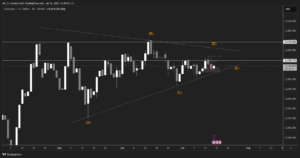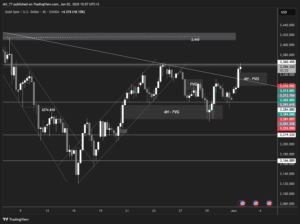European stocks rose today, as investors believe the banking crisis will be contained.
European stocks rose on Tuesday as investors believe the banking crisis would be contained and the wave of market turmoil would end.
UBS Bank shares rose 1.63% after the bank’s CEO, Ralph Hammers, said that although he did not seek an acquisition deal, it was an opportunity to accelerate growth and stressed that the acquisition was never to close Credit Suisse, at a time when it rose It includes Credit Suisse shares by 2.28%.
The Stoxx Europe 600 index rose 0.49% to 446 points at exactly 07:29 GMT, driven by gains in the banking sector, whose index rose by 1.04%.
The British FTSE 100 index rose by 0.42% at 7,503 points; the German DAX rose by 0.57% to 15,214 points; and the French CAC by 0.65% at 7,124 points.
Telecom Italia rose 1.39% after Bloomberg News reported that the Italian state-backed lender is working on a higher bid for the company’s landline network.
Later today, Christine Lagarde, President of the European Central Bank, and Andrew Bailey, Governor of the Bank of England, will speak about monetary policies and the latest repercussions of the banking crisis.
Japanese stocks closed higher, supported by banking stocks.
Japanese stocks ended trading Tuesday, March 28th, on the rise, supported by the increase in bank stocks, following the easing of concerns about the global financial system after a deal in which First Citizens Bank acquired the assets of the collapsed US Bank Silicon Valley.
The Nikkei index rose 0.15% to close at 27518.25, while the broader Topix index rose 0.25% to close at 1966.67 points.
The banking sector index rose 1.96% and was the best performer among 33 sub-indices representing business sectors on the Tokyo Stock Exchange. Resona Banking Holding Group shares jumped 4.08% and were the biggest gainers on the Nikkei index.
Mizuho Financial shares increased by 2.47%, Sumitomo Financial Group by 2.67%, and Mitsubishi UFJ Financial Group by 1.7%. However, the performance of heavy stocks affected the Nikkei index, as Tokyo Electron declined by 0.33%, Advantest by 0.75%, and Shin-Etsu Chemical by 1.19%.
The dollar is falling for the second day in a row against the major currencies.
The dollar fell for the second day in a row against major currencies on Tuesday, as easing fears of a comprehensive banking crisis led to declining demand for safe-haven assets.
Traditionally a safe-haven currency, the yen rose strongly, recouping overnight losses, and analysts point to inflows linked to the country’s fiscal year ending on Friday.
The Australian and New Zealand dollars also jumped as the Australian dollar got additional support from better-than-expected housing sales data.
The dollar index, which measures the performance of the US currency against six major currencies, including the yen, fell 0.16% to 102.59 during Asian trading, extending its losses of 0.35% on Monday.
The US currency tumbled to 130.505 yen during the session and was last traded 0.71% lower at 130.64, giving up its 0.64% gains in the previous session.
The euro rose 0.1% to $1.0809, while the pound rose 0.23% to $1.2315. The Australian dollar rose 0.53% to $0.6686, and the New Zealand dollar rose 0.49% to $0.62265.
Oil is moving narrowly, focusing on supply concerns and the banking crisis.
Oil prices moved in a narrow range during early Asian trading today, Tuesday, after rising in the previous session. Oil markets focused on developments in the banking crisis, concerns about supply, and indications of increased demand. Brent crude futures fell 0.5% to $77.73 a barrel at 04:18 GMT. US crude fell 0.19% to $72.67 a barrel.
Prices rose during the previous session after Turkey stopped pumping crude from the Kurdistan region through a pipeline after a ruling in an arbitration case confirmed that Baghdad’s approval was necessary to ship the oil.
And the announcement of First Citizens Bank yesterday, Monday, that it will take over the deposits and loans of the collapsed Silicon Valley bank raised feelings of optimism about the situation of the banking sector, which sparked turmoil in the financial markets.
It was reported that the US authorities had begun deliberations on expanding the emergency lending facility. Indications of solid Chinese demand supported oil prices.
An annual forecast issued by a China National Petroleum Corporation research unit yesterday indicated that China’s crude oil imports are expected to rise by 6.2% in 2023 compared to last year, to 540 million tons. An initial survey showed that US crude oil inventories rose by about 200,000 barrels last week.
The Dow Jones rose for the third consecutive session, supported by central banks, while growth stocks pressure the Nasdaq Composite.
The performance of US indices varied in Monday’s session, with the Dow Jones and S&P 500 rising, supported by the acquisition of Silicon Valley assets. At the same time, the Nasdaq Composite Index fell under pressure from technology stocks.
The US stock exchange also saw cryptocurrency-related shares fall after the CFTC said it was suing Binance and its CEO for operating an “illegal” exchange and a “bogus” compliance program.
The Dow Jones rose by 0.6%, or 194 points, recording a third consecutive daily rise, to close above the 200-day moving average.
Support came from the shares of central banks after JPMorgan Chase jumped by about 3% after the recession of banking crisis fears. The S&P 500 index rose by 0.2% to close at 3977 points, recording the third consecutive daily rise.
The energy index topped the list of the sectors that rose the most after the substantial gains achieved by oil prices on Monday, supported by the suspension of Kurdistan exports.
The financial sector index rose 1.9% after shares of First Citizens Bank jumped 54% to their highest levels in more than a year after it acquired Silicon Valley deposits and loans.
Shares of First Republic Bank also rose after news that US authorities are considering more support for banks, which could give the troubled bank more time to shore up its balance sheet.
The Nasdaq Composite Index fell by 0.5% in Monday’s session to close at 11,768 points, under pressure from the technology sector, which declined by 1.3%.
The pressure mainly came from Apple’s stock, which fell from its highest level in 6 months to close at $185.
Disclaimer: This article is not investment advice or an investment recommendation and should not be considered as such. The information above is not an invitation to trade and it does not guarantee or predict future performance. The investor is solely responsible for the risk of their decisions. The analysis and commentary presented do not include any consideration of your personal investment objectives, financial circumstances, or needs.





